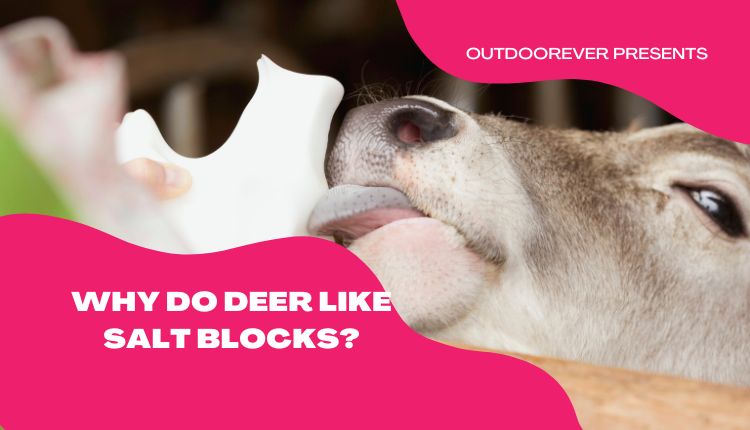Yes, deer really like salt blocks and salt blocks are among the most used deer attractants around. And the reason is that deer can’t seem to get enough of salt or salt blocks in the wild. But why are deer so hooked on salt? This is the question we will be looking to answer in this article.

Table of Contents
Why Do Deer crave Salt?
There is a heated debate among hunters and even biologists as to why deer love licking salt blocks. And the debate centers on whether salt is necessary for deer growth or not. But, regardless of which side of the argument you fall, there is no denying that sodium is rare in nature. So sodium deficiency creates more craving for salt.

Also, there is no denying that deer and other animals, humans included, can get addicted to salt. I am sure you know a friend who can’t seem to get enough of salty foods. This is because salt causes a spike in the brain’s dopamine, known as the pleasure hormone.
Because of this, deer typically get a strong urge to lick salt blocks. And since sodium is a rare compound in nature, salt blocks provide a constant supply of salt for deer. This is why deer are so hooked on salt; salt blocks are such effective attractants.
Do Deer Really Need Salt?
This is the question that elicits heated debate among hunters and biologists. However, research on the subject reveals that deer are attracted to sodium chloride and calcium chloride salt licks.
And for those unaware, sodium chloride is the scientific term used to describe table salt. Researchers have also found that calcium and sodium are important to deer bodily functions.
For instance, deer antlers comprise 20% calcium and 10% phosphorous. As such, in one way or form, calcium and sodium are essential to deer. Thus researchers and scientists recommend a salt concentration of 16% calcium and 8% phosphorous.

Why You Should Add Calcium And Phosphorus In Salt attraction Areas?
Deer are known for their impressive antlers. But how do deer get the calcium they need to grow them? For example, bucks extract 40% of their needs from their skeletal structure and apply it to growing antlers. This is why many people recommend adding about 16 to 20 percent calcium, and eight to ten percent phosphorus in deer feeders or salt attraction areas for deer. In these ways, you actually help supply the deer with what they need and help maintain their habitat.
Types Of Salt Attractants
When you decide to use salt to attract deer, there are different varieties to choose from. Some come with additional minerals, such as proteins. You can also find flavored salt attractants such as apple-scented attractants.
But where salt attractants vary significantly in their physical forms. For example, you can get attractants in the form of either powder or a rock-like block.
Which Is Better, Powder Or Salt Blocks
So should you go for powder salt attractants or solid salt blocks? Well, both have their pros and cons. Powder salt attractants are easier to use for attracting a herd of deer. You can spread the powder attractant over a wider area to attract more deer.
With a salt block, only one deer at a time can lick the block, depending on size. This means attracting a herd of deer using a salt block is a bit tricky. Also, salt blocks can be heavy, making them challenging to transport and set up.
However, salt blocks, which typically look like rocks, have one thing going for them. Because they look like natural rocks, they blend in better with natural surroundings.
How to Attract Deer With a Salt Block
Research shows that deer get attracted to salt during spring and summer. This is when the vegetation is lush, and deer are growing their antlers. Also, this is the time of year when most does are rising their fawns.
When To Put Out Salt Blocks For Deer: Best Time To Use Salt Attractants
The best moths to use salt attractants seem to be the months of April, May, and June. This is because usage and the need for salt among deer gradually decrease after June.
Where And How To Apply Salt Attractants
To attract deer with salt attractants, you must know how and where best to do it. Here are some Tips
- Using powder attractants, the best soil to spread it over is heavy clay soil.
- Salt leaches into the soil and disappears. Therefore powder salt attractants do not work well in sandy soils.
- Also, you want to apply your attractant on flat ground. Typically you cant to place the attractant in a ridgetop in a shallow depression.
- Also, I will advise you to place the salt brick under any kind of cover because if you do not so after a few rainfalls the brick will dissolve which is just a waste of money. If you can’t cover the brick then just rely upon the block.
- You can also apply the attractant on a known deer trail, where you know deer pass frequently.
- As for when to use the attractant, the best month is March. This will ensure the attractant will be fresh when the deer demand for salt peaks in the summer and spring.
- When placing a salt block, choose areas surrounded by bushes or trees. Ideally, a place where you can hide and stalk deer without being detected. Salt blocks have a hole drilled into one end.
- Take a wooden or steel post, drive it into the ground, and mount the block onto it using the hole drilled into it. The pole should be about 3 feet tall, so the block is 3 feet from the ground.
Regular Salt Licks Vs. Mineral Blocks
Mineral blocks differ from salt licks because they have additional nutrients such as proteins. Salt licks, on the other hand, contain salt only. So which ones are better? Salt licks may be a good option during summer or spring when deer crave salt.
But come winter, their appetite for salt will have decreased. Using mineral blocks instead will be a good idea. These blocks can be scented to attract deer all year round. Therefore mineral blocks can attract deer all year round, while salt leaks are suited to summer and spring.
Thus for the best results, you are better off going with mineral blocks over salt licks. The best place to place mineral blocks is along a trail leading to a food source. So you can use mineral blocks with food plots, where you put the blocks on a trail to the plot.
FAQ
Conclusion
There is a lot of information and debate about whether salt is essential to deer growth. But all parties agree, though, that deer, like most other animals, love licking salt. Therefore salt attractants in particular mineral blocks will be a good choice if you want to attract deer.
Salt attractants come in a variety of types, and there are many options available for you to choose from.








































